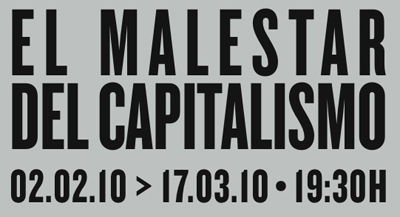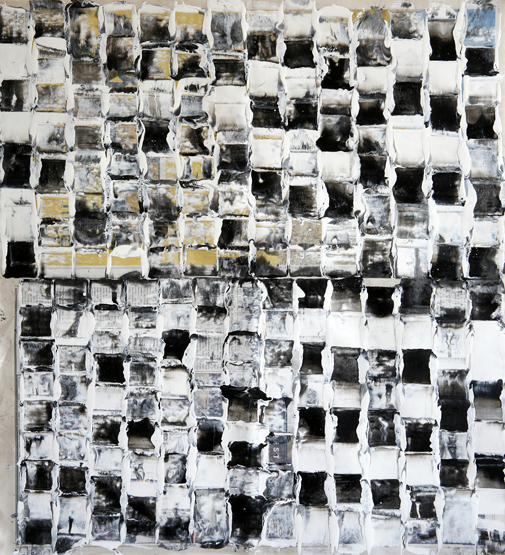DISCOMFORT OF CAPITALISM
January 11th, 2010 by audiolabQueridos amigos, medio recuperados de estas inolvidables fiestas y su indescriptible fin de año, os envío la primera propuesta para regresar otra vez en la bendita desolación contemporánea, sin aglomeración familiar ni televisión a todo volumen. Veamos.
Las grandes ciudades y los medios de comunicación crecen globalmente. Atrás quedan compartimentos secretos, barrios, viviendas, urbanizaciones privadas, naciones y regiones olvidadas. Sobre todo, un poco aturdidos, queda un sinfín de seres humanos a la espera, desposeídos de raíces y, a veces, de cualquier distancia anímica que les permita ser libres frente a “la sociedad”. A la espera: y sin embargo, decíamos no creer en otra vida… ¿Qué hacemos entonces con todos estas zonas opacas a la comunicación, qué posibilidades culturales y políticas, qué peligros podemos esperar de ellas?
Mientras gestionamos nuestro archipiélago de escenarios y franjas horarias separadas, ¿es posible que el pensamiento, a través de una acción y -sobre todo- una existencia cambiada, sirva todavía para revitalizar una experiencia común? De un lado, tenemos el silencio de la eficacia laboral; de otro, viajes secretos por la Red, series televisivas de ciencia ficción, efectos especiales para acumular alguna vivencia que nos permita sentirnos vivos, dormir. ¿Cómo romper esta funcional bipolaridad entre tedio y escándalo, entre parálisis e interactividad, entre secreto y estruendo de la que nosotros también somos cómplices? Debemos analizar cómo sea posible una nueva intervención del pensamiento en un mundo entregado a la urgencia periodística. Estresados por una información que sirve sin cesar esquirlas del planeta, ¿qué queda de una nueva experiencia de la reflexión y de la acción, del ideal práctico del pensamiento? ¿Puede éste ayudar al ciudadano a salir de su retiro defensivo, de este pragmatismo más o menos mudo en la cercanía, donde sin embargo se juegan los cambios?
Tal vez le esté reservado al pensamiento, a la filosofía, algún lugar significativo en la necesaria “reconversión” de nuestras vidas y nuestras sociedades después de la euforia de décadas anteriores. ¿Exige incluso el emergente panorama urbano, con veinticinco grandes metrópolis a partir de 2010, una revitalización del papel público del intelectual?
Con la vehemencia que “nos” caracteriza, cuestiones como estas y muchas otras implicadas serán planteadas en “El malestar del capitalismo”, un seminario que, de Agamben a Badiou, uno se empeñará en que sea altamente polémico. Después, claro, depende de cada cual que todo siga igual o no.
Vuestro,
Ignacio Castro Rey
>>> DOWNLOAD PDF
Estimad@s amig@s;
El Círculo de Bellas Artes tiene programado para este febrero un Seminario de Filosofía dirigido por Jorge Alemán, Germán Cano e Ignacio Castro. El Seminario llamado El malestar del capitalismo propone realizar una reflexión sobre cinco nombres clave del pensamiento actual: Giorgio Agamben, Alain Badiou, Ernesto Laclau, Tiqqun y Slavoj Žižek.
Les adjunto el flier y el link donde pueden encontrar más información y la posibilidad de realizar la Matrícula Online.
EL MALESTAR DEL CAPITALISMO
Pensamiento y acción: Agamben, Badiou, Laclau, Rancière, Tiqqun, Žižek
Directores: Jorge Alemán, Germán Cano e Ignacio Castro
02.02.10>17.03.10
19:30 H
Programa desarrollado por días
Reciba un cordial saludo;
Andrea De Pascual
Área de talleres y Didáctica
TLF. 913 605 409
Círculo de Bellas Artes
www.circulobellasartes.com
C/ Alcalá 42
28014 Madrid




 Standing by what you write is the springboard Ben Watson uses to dive into a typically vigorous exposé of his ideas in Noise as Permanent Revolution or, Why Culture is a Sow Which Devours its Own Farrow. Taking issue with The Wire‘s Sam Davies for trashing an Ascension gig in Bristol in 1994 only to remember it fondly 13 years later (being able to change your mind and admit that you’re wrong is obviously anathema to Ben’s militant aesthetix), he comes up with some splendidly quotable lines (how about “the courage of youth enables it to look directly in the face of things.. [i]ts folly is to imagine that no-one else has ever done so” and “people who talk about the problems of modern music without talking about capitalism and commodity fetishism are themselves one of modern music’s problems”?), though one wishes he’d spent more time explaining the subtleties of Giambattista Vico (see photo)’s Scienza Nuova – a work I’m not at all familiar with but for which this article has most definitely whet my appetite – than taking potshots, albeit amusing and well-aimed, at his former employers at Wire HQ. Watson writes well – he’s one of the few contributors to this book whose voice you can really hear from reading his prose – but quite why Jaworzyn’s Ascension is “THE answer to dilemmas facing anyone discontent with the musical ready-meals dished up by commercial interests” isn’t explained, and what Tony Oxley, Fernando Grillo, Iancu Dumitrescu and Ana-Maria Avram are doing in a thesis ostensibly about Noise is anybody’s guess.
Standing by what you write is the springboard Ben Watson uses to dive into a typically vigorous exposé of his ideas in Noise as Permanent Revolution or, Why Culture is a Sow Which Devours its Own Farrow. Taking issue with The Wire‘s Sam Davies for trashing an Ascension gig in Bristol in 1994 only to remember it fondly 13 years later (being able to change your mind and admit that you’re wrong is obviously anathema to Ben’s militant aesthetix), he comes up with some splendidly quotable lines (how about “the courage of youth enables it to look directly in the face of things.. [i]ts folly is to imagine that no-one else has ever done so” and “people who talk about the problems of modern music without talking about capitalism and commodity fetishism are themselves one of modern music’s problems”?), though one wishes he’d spent more time explaining the subtleties of Giambattista Vico (see photo)’s Scienza Nuova – a work I’m not at all familiar with but for which this article has most definitely whet my appetite – than taking potshots, albeit amusing and well-aimed, at his former employers at Wire HQ. Watson writes well – he’s one of the few contributors to this book whose voice you can really hear from reading his prose – but quite why Jaworzyn’s Ascension is “THE answer to dilemmas facing anyone discontent with the musical ready-meals dished up by commercial interests” isn’t explained, and what Tony Oxley, Fernando Grillo, Iancu Dumitrescu and Ana-Maria Avram are doing in a thesis ostensibly about Noise is anybody’s guess.